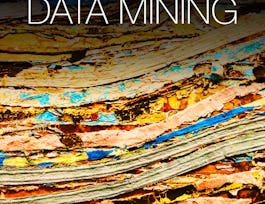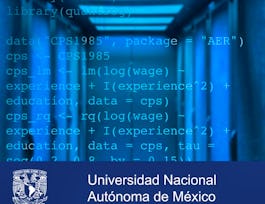Welcome to Introduction to Analytic Thinking, Data Science, and Data Mining. In this course, we will begin with an exploration of the field and profession of data science with a focus on the skills and ethical considerations required when working with data. We will review the types of business problems data science can solve and discuss the application of the CRISP-DM process to data mining efforts. A brief overview of Descriptive, Predictive, and Prescriptive Analytics will be provided, and we will conclude the course with an exploratory activity to learn more about the tools and resources you might find in a data science toolkit.



Intro to Analytic Thinking, Data Science, and Data Mining
This course is part of Data Science Fundamentals Specialization

Instructor: Julie Pai
Sponsored by Louisiana Workforce Commission
9,789 already enrolled
(144 reviews)
What you'll learn
The knowledge and skills needed to work in the data science profession
How data science is used to solve business problems
The benefits of using the cross-industry standard process for data mining (CRISP-DM)
Skills you'll gain
Details to know

Add to your LinkedIn profile
2 assignments
See how employees at top companies are mastering in-demand skills

Build your subject-matter expertise
- Learn new concepts from industry experts
- Gain a foundational understanding of a subject or tool
- Develop job-relevant skills with hands-on projects
- Earn a shareable career certificate


Earn a career certificate
Add this credential to your LinkedIn profile, resume, or CV
Share it on social media and in your performance review

There are 4 modules in this course
Welcome to Module 1, Data Science: The Field and Profession. In this module, we will review data science as a field and explore the concepts of small and big data. We will also survey the skills of successful data scientists and discuss the types of business problems data scientists might be asked to solve in the near future.
What's included
2 readings1 discussion prompt
Welcome to Module 2, Data Science in Business. In this module, we will take a closer look at the applications of data science in a business environment and discuss ethical considerations to keep in mind when working with data.
What's included
1 video2 readings1 assignment
Welcome to Module 3, Data Mining and an Overview of Data Analytics. In this module we will begin with an explanation of CRISP-DM, a cross-industry standard process for data mining. We will also provide an introduction to descriptive, predictive and prescriptive analytics.
What's included
2 readings1 discussion prompt
Welcome to Module 4, Solving Problems with Data Science. In this last module of the course we will explore some real-world applications of data science solutions and take a closer look at the types of tools and programs you might expect to see in a data science toolkit.
What's included
1 video2 readings1 assignment1 discussion prompt
Instructor

Offered by
Why people choose Coursera for their career




Learner reviews
144 reviews
- 5 stars
57.63%
- 4 stars
20.13%
- 3 stars
11.80%
- 2 stars
5.55%
- 1 star
4.86%
Showing 3 of 144
Reviewed on Jan 2, 2021
I consider this course a must for one's journey into Data Science. The videos are short and to the point to serve the purpose of the course.
Reviewed on May 20, 2021
It is informative and gives me overview about data science and the future
Reviewed on Sep 22, 2022
I learnt about CRISP DM process, Data Science tools, Decision Trees in this course.
Recommended if you're interested in Data Science

University of Illinois Urbana-Champaign

University of Colorado Boulder

Universidad Nacional Autónoma de México

University of Illinois Urbana-Champaign

Open new doors with Coursera Plus
Unlimited access to 10,000+ world-class courses, hands-on projects, and job-ready certificate programs - all included in your subscription
Advance your career with an online degree
Earn a degree from world-class universities - 100% online
Join over 3,400 global companies that choose Coursera for Business
Upskill your employees to excel in the digital economy


